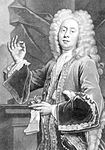| The Cutter of Coleman Street | |
|---|---|
 Abraham Cowley around the time the play premiered. | |
| Written by | Abraham Cowley |
| Date premiered | 16 December 1661 |
| Place premiered | Lincoln's Inn Fields Theatre, London |
| Original language | English |
| Genre | Restoration Comedy |
| Setting | London, present day |
The Cutter of Coleman Street is a comedy play by the English writer Abraham Cowley. It premiered at the Lincoln's Inn Fields Theatre on 16 December 1661, performed by the Duke's Company. Cowley had originally written it in 1658 during the English Commonwealth era. The title refers to Coleman Street in the City of London. The Royalist Cowley inserted lines mocking the recent republican government of England, including Thomas Harrison who had been executed for regicide the previous year. [1] Although it was released during the Restoration period, along with The Committee its debt to earlier traditions mean that it is not a full Restoration comedy in the style that would flourish after George Etherege's The Comical Revenge in 1664. [2]
The original cast included Thomas Betterton as Colonel Jolly, Henry Harris as Young Trueman, Thomas Lovell as Old Trueman, Cave Underhill as Cutter, Samuel Sandford as Captain Worme, James Nokes as Puny, Mary Betterton as Aurelia, Anne Gibbs as Lucia and Jane Long as Laughing Jane. [3]
